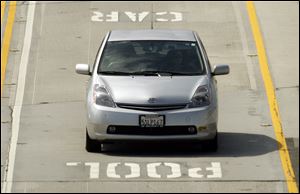
Hybrid owners losing right to use fast lane in Calif.
6/30/2011
Hybrids such as this Toyota Prius on I-405 in Los Angeles will have to return to using regular traffic lanes.
LOS ANGELES -- For six years, California gave owners of hybrid cars the keys to the fast lane: the right to drive alone among carpoolers.
Now hybrids are about to lose the special privilege that was intended as a reward for saving gas and protecting the environment. The vehicles are no longer novel, their key-shaped yellow decals faded from the sun, and transportation officials want to make way for a new generation of even cleaner cars.
Starting Friday, 85,000 hybrid owners have to get back in line with the gas guzzlers, the truckers, and everyone else or face steep fines.
"They can join the rest of us in traffic and suffer," said Elijah Brumfield of Torrance, who drives a Ford Expedition SUV.
State officials say the time has come to end the hugely popular incentive program introduced in August, 2005, because they've met their goal of getting drivers to switch to low-emission hybrids, which run on both electricity and gasoline.
For some Southern California drivers, using the HOV lane cut commute times in half, but it's an advantage normally for cars carrying at least two people. Hybrid drivers who relied on the perk dread returning to gridlock and stop-and-go traffic.
"I'm really not looking forward to it," said Alan McAllister of Murrieta, who drives 55 miles each way to get to his teaching job at Fullerton College. "Over the last couple of weeks, I've been noticing me going 55 mph in the carpool lane and other people virtually at a dead stop. I can't believe I'm going to sit in that again."
California had about 57,000 registered hybrids when it became the second state after Virginia to let hybrids with no passengers use carpool lanes. Other states such as Arizona, Colorado, and New York followed.
Thousands of California motorists rushed to send in $8 applications for the decals. Within a year, the Department of Motor Vehicles had issued all available permits.
Only three hybrid models -- Toyota's Prius and Honda's Civic and Insight -- were eligible because they met the standard of at least 45 mpg. State law initially limited the number of qualified vehicles to 75,000 to prevent hybrids from clogging the lanes, but state officials later permitted 10,000 more cars.
Hybrid sales jumped. They now make up 425,000 of nearly 32 million registered vehicles in the state. The decals quickly became a status symbol. Reports of thieves peeling off the stickers went up, as did the resale value of a used hybrid with decals.
Dianne Whitmire, fleet director of a Toyota dealer in Carson, a city south of Los Angeles, said a man at a gas station once offered $35,000 in cash for her 2007 Prius because it had decals. That was $1,000 more than she paid for her then-new car.
"He was shocked that I turned him down," said Ms. Whitmire, who drives 40 miles to work. "I said, 'I could take that money and buy another Prius, but I can't buy time.' "
A few states such as Utah have already stripped hybrids of their special access to carpool lanes. Hybrid drivers in Virginia will lose their privileges in June, 2012. In Maryland, the practice ends in September, 2013.